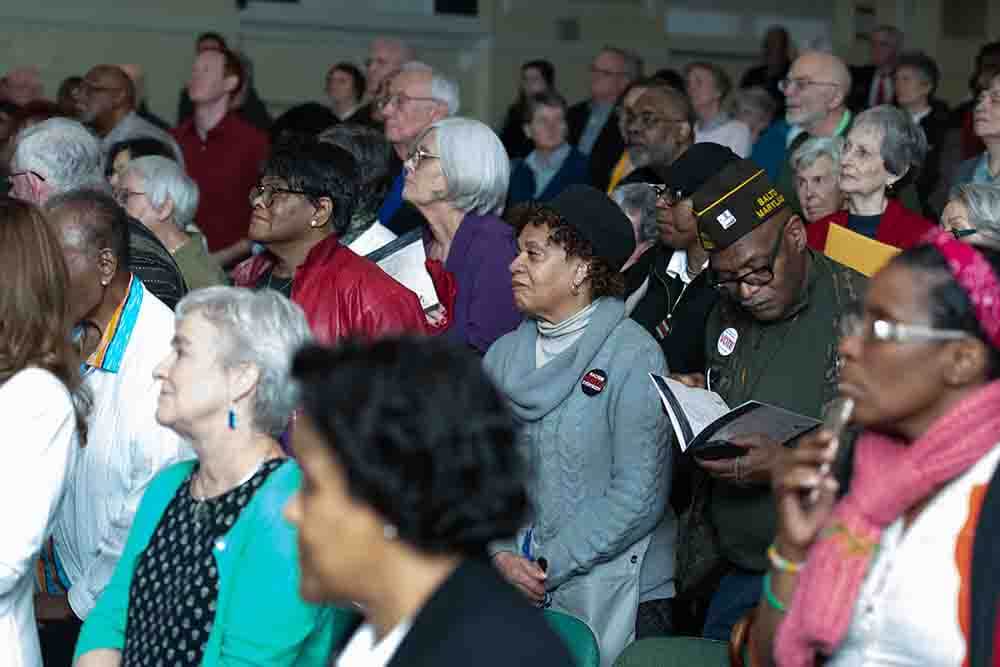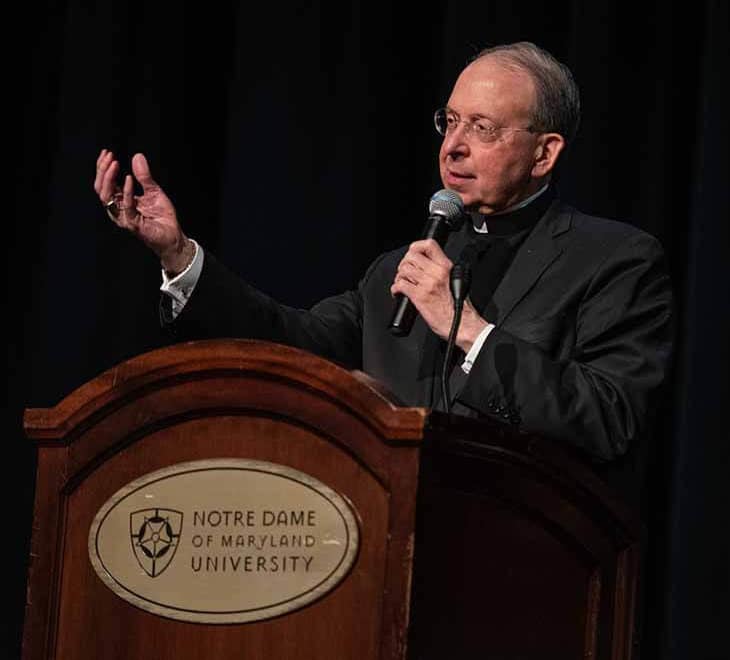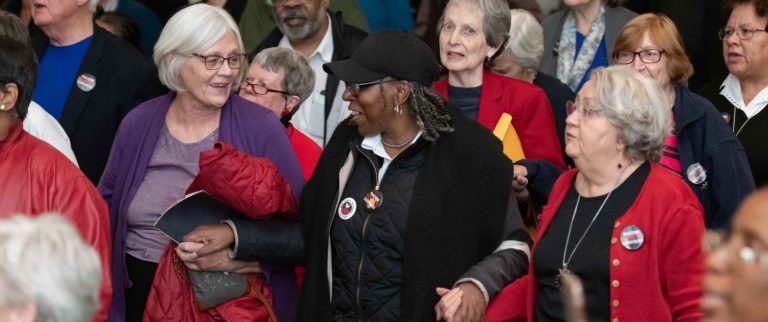
Participants in a racism listening session sponsored by the Archdiocese of Baltimore April 29 brought a variety of experiences to the attention of Baltimore’s bishops and an audience of more than 250.
Speakers spoke of being questioned about their presence on church property simply for being black, of having difficulty entering the seminary because of race, being called the n-word when distributing holy Communion at a hospital and feeling unwelcome in the church.
The listening session was prompted by the U.S. bishops’ 2018 pastoral “Open Wide Our Hearts: The Enduring Call to Love – A Pastoral Letter Against Racism,” which calls racist acts sinful because they violate justice.
The event – held at Notre Dame of Maryland University – also followed the January 2019 publication of Archbishop William E. Lori’s second pastoral reflection on the topic, “The Journey to Racial Justice: Repentance, Healing and Action.”
That reflection called for concrete steps to be taken by the archdiocese, including: organizing training and resources to discuss and address the issue of racism; examining the diversity of archdiocesan institutions, parishes, schools and social service programs, and enhancing efforts to further diversify where needed; and strengthening existing efforts to attract new members of the church and candidates for priesthood and religious life from diverse racial and ethnic backgrounds.
Bishop Shelton J. Fabre of the Diocese of Houma-Thibodaux, La., chairman of the U.S. bishops’ Ad Hoc Committee Against Racism, told the audience in his opening remarks that these listening sessions help the bishops understand the “aching pain” of people affected by racism.
The Baltimore event was the sixth such session he had attended, and he is grateful for those who share their experiences, “despite the weight of the harm done.”
Before introducing eight speakers to share their thoughts, Sherita Thomas, chairwoman of the Black Catholic Ministries Board for the archdiocese and moderator for the evening, encouraged those in the audience to share their responses to two questions on comment cards provided: “What did you learn from listening to the experiences of tonight’s speakers?” and “What concrete steps should we as Catholics through the archdiocese adopt to work for racial justice in the church and our local communities?”
She said that audience members could give it some thought and respond within two weeks, so that responses can be compiled for the U.S. bishops’ committee. Commenting will also be available on the archdiocesan website at archbalt.org/racism.
One of the speakers, Carole Norris Greene, a parishioner of St. Gabriel Parish, Woodlawn, and a syndicated columnist on race relations, recalled finding a 5 a.m. Easter Mass in the 1960s so she and her mom could get to a job at a restaurant. Even so, they had to leave just after Communion to catch the bus to work, and the priest celebrating the Mass chastised them for leaving early. “It’s a disgrace! I’ll bet they didn’t put 50 cents in the collection,” she recalls the priest saying.
He was wrong, since Greene had put all the money she had in the collection basket. But even more so, “We were the only people of color in attendance. We took his condemnation personally.”
[metaslider id=124330]
She said she went on to fully embrace her faith, working in a number of positions in dioceses and at the national level. “But when I looked back over my life as an African-American Catholic in the Archdiocese of Baltimore and in other dioceses where I worked for 17 years, I saw something alarming: I couldn’t point to one person whom I invited to consider being Catholic like me. …
“Memories of having been unwelcomed in certain Catholic settings made me not want to introduce such a dilemma in another’s life.”
She quoted the late Archbishop James P. Lyke, who said that the power of the Gospel is blunted when it is wedded to only one cultural expression.
Greene recommended making the home front the place of refuge and renewal. “We can offer refreshments, talk about our family, neighborhood, ambitions, even trials. And we can invite guests to do the same, listening attentively to their stories.”
Redemptorist Father William Guri, a priest from Zimbabwe who is studying at Loyola University of Maryland and lives and assists with ministry at St. Mary Parish, Annapolis, recounted how he had been walking in the Carroll gardens behind the rectory – not wearing his clerical garb – when he noticed a couple taking wedding photos. He deliberately stayed at the opposite end of the gardens so as not to disturb them.
A white man whom Father Guri did not recognize as a parishioner confronted him, asked him what he was doing in the gardens and told him he should leave immediately because he was on private property and his presence was not welcome.
The priest said he explained that he was a priest who lived on the grounds and the man was shocked.
Father Guri said, “I asked him: ‘What were you going to do, to call the police on me or simply to draw and shoot at me? Is this how you treat people like me?’”
He said he “wondered that if my black presence was such a threat in a private garden area, how much of a threat is my blackness perceived by one like this man on the sanctuary while I am celebrating the Eucharist?”
The fact that this incident occurred in the backyard of the rectory where he lives “awakened me to the reality that there are some people to whom I can never be good enough for the simple reason of being black.”
Between each speaker’s comments, the choir from St. Bernardine parish led a Psalm response, singing, “The Lord is kind; the Lord is kind and merciful.”
Deacon Seigfried Presberry, director of the archdiocesan Prison Ministry Program, recalled a time when he was bringing Communion to a man in a hospital ICU. When he introduced himself and offered the Eucharist, the man ripped off his oxygen mask and yelled, “Oh my God, we have n*****s in the Church.”
Deacon Presberry said he left the room, wanting to tell the man he was not that epithet, but a servant of God, but did not. He left the hospital feeling dejected and rejected.
His wife encouraged him to return the following week because that’s what he was called to do.
The next week, the man was still in the hospital but out of ICU. The man and his son, who had also been there the week before, apologized, and when the deacon offered the Eucharist, he took it. Over the weeks, they struck up conversations and after the man’s release from the hospital, even became friends.
The man said he had never met or talked to anyone of color before Deacon Presberry, and he regretted that. “My dear friend passed away several months later and he requested that I preside at his homecoming, which I did,” the deacon said.
Ludiya Abdalla, a student at Notre Dame of Maryland, was born in Egypt to South Sudanese parents and moved to the U.S. when she was 8 months old. She said she is often asked to relate her mother’s story from South Sudan, but “that’s her story, not mine.” She also is often asked to represent the African student experience. “I’m from Portland, Maine,” she told the audience.
She chided the church for not using its high platform to help more locally all those who need assistance, sending aid around the world, but not in its own city.
Other speakers included: Mercy Sister Cora Billings, who talked about her path to vocation in a religious order that had few black sisters; Bernard Franklin, vice president of Student Life at Mount St. Mary’s University in Emmitsburg, who said he is Catholic because of the transforming hand of God, despite how unwelcoming and unloving the church has been to people of his race; Katharina Acosta, who spoke from the Latino experience; and A. Skipp Sanders, former executive director of the Reginald F. Lewis Museum of Maryland African-American History and Culture, who reflected on his experience as a black seminarian.

“Any accommodation the church has made in the past to systemically racist practices within society or within its own ranks or has to end,” Sanders said.
In closing remarks, Archbishop Lori thanked the “very courageous and generous speakers tonight, who have dared to share their personal, and often very painful, stories with us. I am so very sorry for what you have endured, and for the ways explicitly and implicitly that the church played a role in your experiences.”
He said it was clear that racism is part of church and society and is “entrenched in our past and continues today.”
He said that frankly, he found the expressions of faith, hope and love by the speakers almost astonishing. “I am not for a moment suggesting that the responsibility for righting the wrongs of racism should rest on the shoulders of those who bear its burden,” the archbishop said. “That responsibility lies squarely on those of us who have for too long turned a deaf ear and a blind eye to its reality in our midst.”
He promised to continue to listen and to examine the diversity of the archdiocese’s institutions at every level.
In an interview before the event, Bishop Fabre said in the sessions he had attended, he has been hearing people’s pain and hope. The sessions are a model for what the bishops want to see in society. “We want people to get together, dialogue, have a conversation,” he said, noting that Pope Francis calls for the same thing – to hear people’s pain and accompany them in their journey.
“The question we are asking is how can we address this together with the richness of the teachings of the church and the sacraments? … We want to bring people to a greater understanding, bring people to action.”
In addition to Archbishop Lori and Bishop Fabre, other listeners at the session included Bishop John H. Ricard, S.S.J., bishop emeritus of Pensacola-Tallahassee and a former auxiliary bishop of Baltimore; and the Baltimore auxiliaries – Bishops Mark E. Brennan, Denis J. Madden and Adam J. Parker.
Scroll below to read a feed of the Catholic Review’s livetweets from the listening session.
Updated 5/1/19, 1:06 p.m., to correct spelling of last name of Skipp Sanders. Updated 5/2/19 at 11:57 a.m. to correct in the seventh paragraph the number of sessions that have been held across the country.
Baltimore Racism Listening Session
Email Christopher Gunty at editor@CatholicReview.org


